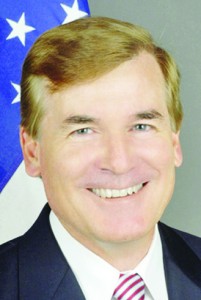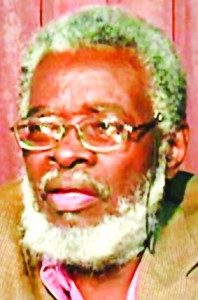
D Brent Hardt
The United States Agency for International Development (USAID) US$ 1.2 million Leadership and Democracy (LEAD) governance project is intended to address the lack of compromise and consensus, which have dogged the work of Parliament since the 2011 elections, the U.S. government has said.
In 2012 and 2013, the tripartite talks among the People’s Progressive Party/Civic (PPP/C), the Alliance For Change (AFC) and the A Partnership for National Unity (APNU) broke down, resulting in billions of dollars being slashed from the budgets.
Additionally, the parties have failed to agree on the construction of the world class Marriot International Hotel and the Amaila Falls Hydro Power Plant and now the Anti-Money Laundering and Countering the Financing of Terrorism (Amendment) Bill.
Included in the LEAD project is a component that is designed to build consensus among the parties at the level of the National Assembly. The LEAD project will offer (non-material/non-financial) technical assistance to the PPP, APNU and the AFC in a non-partisan, inclusive manner. This objective, if the project comes into operation will be achieved through cross-party negotiation workshops, according to the project document.

Dr Roger Luncheon
The LEAD programme proposed bi-monthly workshops on political negotiation, featuring experts in the field. “These workshops will be offered to all parties in one setting. The programme will be conducted in this multi-party format to foster interaction between the parties outside of the formal parliamentary setting, encouraging them to take part in mock negotiation sessions with their counterparts,” a section of the project document stated. It was stated that this technique has proven to be effective in other parts of the world.
Additionally, through the programme, consultative sessions will be facilitated to develop the ability to debate, deliberate and negotiate legislative initiatives. It is believed that by equipping parties with the ability to arrive at meaningful consensus, the demands of citizens will be addressed.
Policies
In the area of issue-based policy development, the programme will host workshops to review techniques in research and analysing constituent concerns, in addition to the development of policies.
“Through these workshops, the programme will share tools for addressing constituent concerns. The programme also intends to organise multistakeholder discussion groups for engagement with citizens, civil society, the private sector, among others, to provide input for developing legislative priorities.”
It was contended that citizens in general are not acquainted with their elected representatives in the House; hence, the programme would create the desirable environment for politicians to interact with citizens within the confines of the current electoral laws. This would be accomplished through town hall meetings and multi-party issue forums.
Meanwhile, component two of the programme focuses primarily on strengthening the National Assembly and citizen engagement. “A legislative expert will be hired and be seconded to the National Assembly for a minimum of four to six months to provide intensive consultative advice and training to members of Parliament and National Assembly staff.”
It was further explained that the programme’s chief of party and other technical experts and or consultants from the U.S., Canada, Barbados and Trinidad and Tobago will equip parliamentarians and staffers with the requisite skills and knowledge to effectively research and draft legislations.
“With the limits on the time members of Parliament can devote to specific issues and with no individual staff, members are significantly hampered in their ability to effectively analyse pressing issues facing the country, understand constituents’ concerns, and research solutions that can shape legislative agendas,” the project document explained.
Additionally, in component two, the LEAD initiative seeks to establish a “women’s Parliament caucus”, with the intention of providing a forum for women issues to be discussed.
“Such a caucus will help foster non-partisan discussion and build consensus between representatives from the different political parties on issues of mutually-shared common interests.”
Youth component
Thirdly, the LEAD programme proposes to motivate and better equip Guyanese youth with the necessary skills to be integrally involved in politics and civic processes. “It is critical for young citizens to understand their roles and responsibilities in a democracy so they can participate constructively in the political process and become more engaged as citizens in civil society,” it was stated.
The initiative will engage youth groups and civil society organisations in civic education campaigns and events to generate broader interests among youths. Additionally, public-private partnerships will be fostered to increase the probability of sustainability and marketing opportunities for youths, not only in government and civil society, but also in the private sector. This will be achieved through youth debate clubs and youth civic education festivals.
In the final component of the project, attention will be given to civic and voter education on the implementation of local government reform and local elections. Officers working under the LEAD programme will enhance knowledge of citizens on the recently approved local government reform legislation, in addition to the role of local government and the rights and responsibilities of citizens and elected officials.
Last week, Presidential Advisor on Governance Gail Teixeira informed the press that the government and the U.S. would be meeting this week to achieve a consensus on the implementation of the project. However, U.S. Ambassador D Brent Hardt told GTI on Tuesday that the administration has not yet consulted him on a possible date, although he would have inquired about it. “I am available at anytime,” he said.



